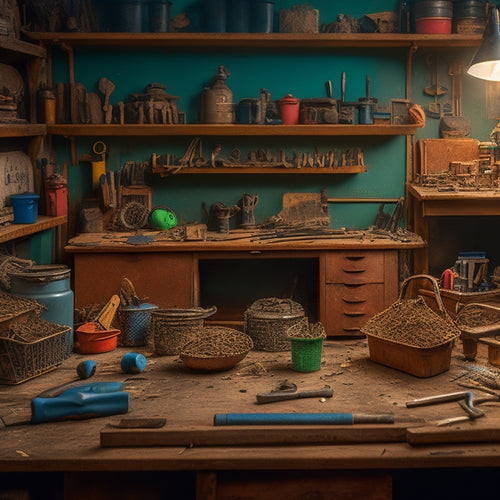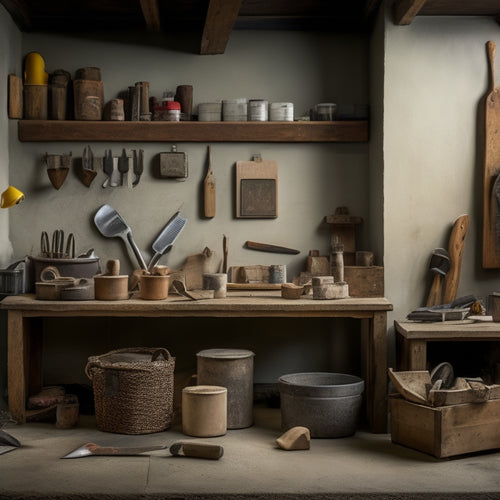
Garage Renovation Power Tool Checklist for Block Garages
Share
When tackling a block garage renovation, you'll need a thorough arsenal of power tools to guarantee efficient and professional-grade results. You'll require essential drilling and boring tools like drill presses, cordless drills, and hammer drills, as well as cutting and shaping power tools like circular saws and miter saws. Additionally, you'll need fastening and joining equipment, measuring and testing devices, and heavy-duty demolition tools like demolition hammers and reciprocating saws. With safety gear and a well-planned project strategy, you'll be well-equipped to take on your garage renovation - and that's just the foundation of what you need to know to get started.
Key Takeaways
• A comprehensive power tool checklist for garage renovation should include essential drilling, cutting, fastening, measuring, and demolition tools.
• Identify the specific tasks and materials involved in the renovation to determine the necessary tools and accessories.
• Ensure you have the right drill bits, saw blades, and fasteners for the job to avoid project delays and costly mistakes.
• Regular tool maintenance and safety gear are crucial to prevent accidents and extend the lifespan of your power tools.
• Develop a project plan, including a site assessment, material list, and work schedule to ensure efficient progress and a successful renovation.
Essential Drilling and Boring Tools
You'll need a reliable drill press to make precise, perpendicular holes in various materials, as well as a cordless drill/driver for greater versatility and portability during your garage renovation project.
With these essential tools, you'll be able to tackle a range of drilling and boring tasks with confidence.
When it comes to drill types, consider investing in a hammer drill for masonry and concrete work, and a right-angle drill for tight spaces and corners.
For boring techniques, you'll want to master the art of step drilling, which involves using a series of drill bits to create a hole of the desired size. This method is particularly useful for metal and hardwood applications.
Additionally, consider investing in a set of high-quality drill bits, including twist bits, spade bits, and hole saws, to guarantee you have the right tool for the job.
Cutting and Shaping Power Tools
As you move on to cutting and shaping tasks in your garage renovation, you'll need to guarantee you have the right power tools for the job.
You'll be working with various materials, from lumber to metal, and that's where circular saws and miter saws come in.
These tools will help you make precise cuts and angles, so it's crucial to understand their capabilities and applications.
Circular Saw Essentials
With a garage renovation project, a circular saw is an indispensable cutting tool that will likely be used daily to make straight cuts in lumber, plywood, and other materials for various tasks, from framing to installing cabinets.
As you'll be relying on it heavily, it's important to prioritize circular saw maintenance to guarantee peak performance and extend its lifespan. Regularly check and clean the saw's air vents, motor housing, and blade guard to prevent dust and debris buildup. Additionally, inspect the blade for signs of wear, such as dullness or chipping, and replace it as needed.
When it comes to blade selection, choose a high-quality blade that suits your specific cutting tasks. For general-purpose cutting, a 24-tooth blade is a good starting point. However, if you're working with thicker materials or need more precise cuts, consider a blade with more teeth or a specialized blade designed for specific materials, such as plywood or metal.
Miter Saw Precision
When making precise angled cuts in wood, a miter saw is an essential power tool that allows for accurate bevels and crosscuts, making it a key component in your garage renovation project's cutting and shaping arsenal.
To get the most out of your miter saw, you'll need to make precise adjustments to guarantee accurate cuts. Start by checking the saw's bevel scale and adjusting it as needed to confirm it's square to the fence. Next, adjust the miter scale to set the desired angle, and use the saw's precision detents to lock it in place.
Regular miter saw maintenance is also important to maintain accuracy and prevent wear. Check the saw's blade for dullness and replace it as needed, and clean the saw's rails and fences to prevent dust buildup. Additionally, lubricate the saw's pivot points to keep it running smoothly.
Fastening and Joining Equipment
When it comes to fastening and joining equipment, you'll need a range of tools to get the job done efficiently.
You'll be working with screw and nail guns to drive fasteners, and drill bit accessories will be essential for precise hole placement.
To guarantee a secure hold, don't forget to add clamping and gripping tools to your arsenal.
Screw and Nail Guns
You'll frequently reach for screw and nail guns, essential fastening and joining equipment, to drive home countless screws and nails throughout your garage renovation project. These power tools will become your trusted companions as you assemble, construct, and secure various components of your garage. When selecting screw and nail guns, consider the specific tasks at hand and the materials you're working with.
| Screw Type | Recommended Screw Gun |
|---|---|
| Wood screws | Framing screw gun with high-torque motor |
| Drywall screws | Drywall screw gun with adjustable depth control |
| Self-drilling screws | Self-drilling screw gun with rapid-fire capability |
| Deck screws | Deck screw gun with ruggedized design and long battery life |
Drill Bit Accessories
Select the right drill bit accessories, including bits, drivers, and sockets, to optimize your fastening and joining tasks and guarantee precise hole placement, efficient screw driving, and reduced tool wear.
When choosing drill bits, consider the type and material you need for your garage renovation project. You'll want to have a variety of drill bit types on hand, such as twist bits, spade bits, and hole saws, to tackle different tasks.
Drill bit materials also vary, with options like high-speed steel (HSS), cobalt steel, and tungsten carbide (TC) each suited for specific applications. For example, HSS bits are ideal for drilling through wood and metal, while TC bits are better suited for drilling through hardened steel or concrete.
In addition to drill bits, you'll need drivers and sockets to complement your drill. Drivers come in various shapes and sizes, including flathead, Phillips, and hex (or Allen) drivers.
Sockets are essential for driving bolts and nuts, and you'll want to have a range of socket sizes and types, including impact sockets and socket wrenches.
Clamping and Gripping
With your drill bit accessories in order, it's now time to focus on clamping and gripping tools that will help you hold materials in place and apply precise pressure during fastening and joining tasks in your garage renovation project.
You'll need a variety of clamps to tackle different tasks, including bar clamps, pipe clamps, and C-clamps. Each type of clamp is designed for specific grip techniques, so it's important to choose the right one for the job. For instance, bar clamps are perfect for applying even pressure across large surfaces, while pipe clamps are ideal for gripping irregularly shaped materials.
You'll also need to take into account the material you're working with, as some clamps are better suited for wood, metal, or plastic.
Additionally, don't forget to invest in a set of locking pliers, which will allow you to apply consistent pressure and maintain a firm grip on your materials.
Measuring and Testing Devices
Your garage renovation project relies heavily on accurate measurements and precise testing, making a set of reliable measuring and testing devices vital to achieving professional-grade results.
You'll need tools that can provide precise readings and help you identify potential issues before they become major problems.
Here are some must-haves for your measuring and testing device collection:
-
Laser levels: These tools project a precise level line or point, guaranteeing your installations are perfectly aligned and level.
-
Measuring tapes: A sturdy, accurate measuring tape is essential for taking precise measurements and marking cut lines.
-
Multimeters: These devices measure electrical voltage, current, and resistance, helping you troubleshoot electrical issues and guarantee safe working conditions.
With these devices in your arsenal, you'll be able to tackle even the most complex renovation tasks with confidence.
Heavy-Duty Demolition Tools
Demolition tools are the heavy-hitters of your garage renovation arsenal, and you'll need them to break down and remove existing structures, flooring, and walls to make way for new installations and upgrades. These powerful tools will help you tackle even the toughest demolition tasks with ease and efficiency.
Here are some essential heavy-duty demolition tools you'll need:
| Tool | Description |
|---|---|
| Demolition Hammer | Breaks up concrete, asphalt, and other tough materials |
| Reciprocating Saw | Cuts through metal, wood, and other materials with ease |
| Rotary Hammer | Drills into concrete and other masonry materials |
| Wrecking Bar | Pries apart objects and materials with precision |
When working with these powerful tools, remember to prioritize demolition safety. Always wear protective gear, including gloves, safety glasses, and a hard hat. Additionally, make certain to follow proper tool maintenance procedures to guarantee your tools are in good working condition. Regularly inspect and clean your tools, and replace any worn or damaged parts to avoid accidents and extend their lifespan.
Safety and Protection Essentials
Protect yourself from the hazards of garage renovation by investing in a set of safety essentials that will shield you from harm.
You're about to commence on a project that involves heavy machinery, power tools, and physical labor, which can be hazardous if you're not properly equipped.
Don't take any chances - invest in the right safety gear to guarantee your well-being.
Here are the must-haves for your safety arsenal:
-
Protective eyewear: Safety glasses or goggles that provide protection from flying debris, dust, and other particles that could damage your eyes.
-
Durable gloves: Heavy-duty gloves that offer grip, protection, and comfort while working with power tools and handling rough materials.
-
Respiratory protection: A dust mask or respirator that filters out airborne particles, preventing respiratory issues and other health problems.
Frequently Asked Questions
Can I Renovate My Garage Without Professional Help?
You're wondering if you can tackle your garage renovation on your own? Absolutely!
With the right DIY renovation tips and essential tools, you can transform your space without breaking the bank or relying on professionals.
Start by evaluating your garage's layout, identifying areas that need improvement, and gathering the necessary tools for the job.
How Do I Dispose of Old Garage Materials and Debris?
You're about to tackle the messiest part of your renovation - disposing of old garage materials and debris.
Think of it as excavating a treasure trove of recyclables! You'll need to sort items into categories, separating hazardous waste from non-hazardous materials.
Research local recycling options and waste management facilities to guarantee responsible disposal.
Properly dispose of materials like asbestos, lead paint, and batteries, and consider hiring a professional for larger, more complex items.
What Is the Average Cost of a Garage Renovation Project?
You're wondering about the average cost of a garage renovation project.
Well, expect to spend around $10,000 to $30,000, depending on the scope and materials.
To avoid budget blowouts, prioritize your needs, set realistic expectations, and allocate 10% to 20% for contingencies.
With smart budget planning tips, you'll be able to create a stunning space that meets your needs and stays within your means.
Do I Need to Obtain a Permit for My Garage Renovation?
As you envision your garage renovation, imagine the smooth flow of construction, free from hiccups and setbacks.
But, before you start, you're wise to ask: do you need a permit? The answer depends on your local zoning regulations and renovation guidelines.
Check with your municipal government to determine if your project requires a permit.
Don't risk costly fines or delays - get the necessary approvals and guarantee your dream garage becomes a reality, hassle-free.
How Long Does a Typical Garage Renovation Project Take?
You're probably wondering how long your garage renovation project will take.
Typically, the project timeline spans several weeks to a few months, depending on the scope. The renovation phases can be broken down into planning, demolition, construction, and finishing touches.
You'll need to factor in time for permits, inspections, and material delivery.
On average, a garage renovation can take around 8-12 weeks, but this varies depending on your specific project requirements.
Conclusion
As you begin your block garage renovation, remember that a well-stocked arsenal of power tools is your Excalibur, the key to taming the chaos of demolition and reconstruction.
With this thorough checklist, you'll be well-equipped to vanquish the challenges that lie ahead.
So, gear up, don your armor, and charge into battle – your garage renovation awaits.
Related Posts
-

Why Tool Exchange Matters in Home Renovation
You rely on a well-maintained tool belt to complete home renovation projects efficiently, and having access to the ri...
-

Streamline Your Exterior Renovation Timeline
To streamline your exterior renovation timeline, you'll need to approach the process strategically. Start by planning...
-

3 Beginner-Friendly Tools for Plaster Renovation Success
You'll be glad to know that the three essential tools you need for a successful plaster renovation are the same ones ...


